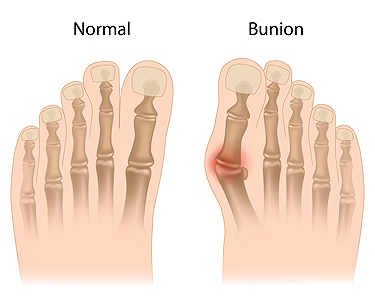Call Us Today! (203) 975-9600
SAME DAY APPOINTMENTS AVAILABLE
Surgery for Bunions
Tuesday, 20 September 2022 00:00
A bunion is a foot deformity that manifests itself as a bony bump near the joint of the big toe. Importantly, bunions might also form at the base of the pinky toe as well, which are known as bunionettes. If you have a bunion, you may experience any number of symptoms, including swelling at the affected joint, redness, and possibly pain. If you have a severe case of bunions that does not respond to other forms of treatment, undergoing a surgical procedure to treat your bunions may possibly be an option. Such a procedure typically requires up to six months of recovery time, and it is primarily concerned with reducing pain and bringing the metatarsophalangeal joint back into alignment. The different types of relevant surgical procedures are known as an osteotomy, arthrodesis, and exostectomy, among others. If you have bunions and think you may be a candidate for bunion surgery, contact a podiatrist today.
If you are suffering from bunions, contact one of our podiatrists of Preferred Footcare, LLC. Our doctors can provide the care you need to keep you pain-free and on your feet.
What Is a Bunion?
A bunion is formed of swollen tissue or an enlargement of boney growth, usually located at the base joint of the toe that connects to the foot. The swelling occurs due to the bones in the big toe shifting inward, which impacts the other toes of the foot. This causes the area around the base of the big toe to become inflamed and painful.
Why Do Bunions Form?
Genetics – Susceptibility to bunions are often hereditary
Stress on the feet – Poorly fitted and uncomfortable footwear that places stress on feet, such as heels, can worsen existing bunions
How Are Bunions Diagnosed?
Doctors often perform two tests – blood tests and x-rays – when trying to diagnose bunions, especially in the early stages of development. Blood tests help determine if the foot pain is being caused by something else, such as arthritis, while x-rays provide a clear picture of your bone structure to your doctor.
How Are Bunions Treated?
- Refrain from wearing heels or similar shoes that cause discomfort
- Select wider shoes that can provide more comfort and reduce pain
- Anti-inflammatory and pain management drugs
- Orthotics or foot inserts
- Surgery
If you have any questions, please feel free to contact our office located in Stamford, CT . We offer the newest diagnostic and treatment technologies for all your foot care needs.
Call Us Today! (203) 975-9600
SAME DAY APPOINTMENTS AVAILABLE








